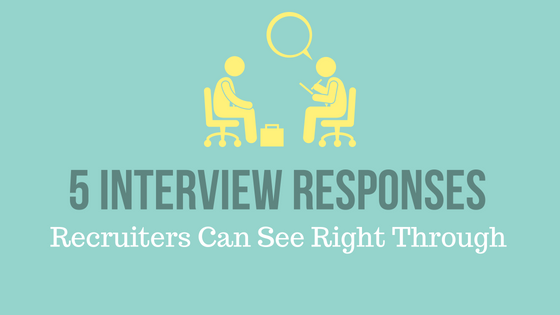So far, we’ve discussed the importance of keeping a schedule when you’re job searching, investigating company cultures, and started talking about interviews. As the interview is such an important part of the hiring process, we thought we’d give it a little more focus. Today, we’re going to discuss five responses that interviewers can see right through.
written by: becca mcknight, promega
Recruiters aren’t pessimists, but throughout the years we have become more cautious and maybe a little suspicious. Many of us interviewed enough candidates that we have come to approach each new person with a “trust but verify” mentality. I’m very trusting in my personal life, but at work, my job is to be a detective. I follow clues to dig up the good, the bad, and the ugly.
During a recent talk with fellow recruiters, we realized there are some things many candidates say that perk up our sleuth ears every single time. These answers may be coming from a truthful and benign place, but they raise suspicions in any good recruiter. The average candidate has no idea what other candidates are saying, so I’m here to share. Recruiters hear these answers often and, take it from us, you’ll come off better in your interview if you avoid them.
What candidates say: “I left my last job because there was no room for growth.”
What recruiters hear: “I was bad at my last job, and no one handed me a promotion so I’m still bitter.”
Better answer: “I am interested in new opportunities to learn and grow. I feel I have a lot to offer, and this position would make a better use of my skill set.”
Instead of blaming your company, use the opportunity to sell yourself as a constant learner and spotlight why this job is a better fit than your current job.
What candidates say: “My biggest weakness is I care too much.”
What recruiters hear: “I think I’m pretty perfect and am not working on myself.”
Better answer: Literally any other true weakness is a better answer.
When a recruiter asks the “tell me about your biggest weakness” question, it isn’t to learn all of your personal flaws; it’s to see how self-aware you are and what steps you are making towards personal improvement. We all have weaknesses, it’s how you deal with them that matters. Caring too much about your job is not a weakness for your employer.
What candidates say: “I prefer not to discuss salary until I know more about the position.”
What recruiters hear: “I haven’t taken the time to do research before this interview.”
Better answer: “Based upon my research and my salary history, I’d be looking for $40,000–$50,000. Is that reasonable for this position?”
Take the time to do a little research on cost of living and reasonable salaries for the job and review your own budget before your interview. It’s ok to answer with a range, which gives you a little wiggle room. If you want, you can also let the interviewer know that you are negotiable and don’t want to price yourself out of a job.
What candidates say: “My boss didn’t like me.”
What recruiters hear: “I’m difficult to manage, and I’ll probably badmouth you later.”
Better answer: Any answer that does not badmouth your current or former company or boss is better than this one. Put your integrity on display and refuse to speak negatively about your boss, even if she was terrible. Saying that you are not able to get along with someone at work makes recruiters wonder if you are difficult to get along with.
What candidates say: “What is your sick time policy?”
What recruiters hear: “I plan on playing hooky quite often, but I want to be sure I get paid for it.”
Better question: “Can you tell me more about your benefits, including paid time off?”
Candidates who ask specific questions early in the interview process about sick time raise red flags about reliability. Sick time is a benefit we offer and are just fine when employees use it, but it’s alarming when that’s the most important question on a candidate’s mind. Save this question for a little later in the interview process and ask for a full benefit summary so you can get a full picture of benefits, perks and time off.
Don’t worry, one bad answer in an interview will not ruin your chances for a dream job. Hopefully this information will help you provide even better answers in the future; answers that are truthful, but will not raise suspicions.
WOULD YOU LIKE TO SEE MORE ARTICLES LIKE THIS? SUBSCRIBE TO THE ISHI BLOG BELOW!
SUBSCRIBE NOW!


